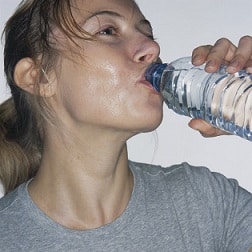 The human body needs water to survive and to function properly, and because we lose water throughout the day we need to constantly drink water in order to keep from getting dehydrated.
The human body needs water to survive and to function properly, and because we lose water throughout the day we need to constantly drink water in order to keep from getting dehydrated.
The body contains 70% water, and we must keep this balance so that:
- our blood continues to flow through our veins delivering all important oxygen and nutrients all over our body;
- our muscles can continue to grow and remain elastic;
- our brains can function normally;
- we maintain our plump, youthful looking skin;
- our kidneys can continue functioning and clear toxins out of our body;
- our joints remain lubricated and cushioned; and
- every cell in our body can grow, recreate and do what it needs to do
We must ensure that we drink water regularly, even if we feel bloated or are retaining water. Strange as it sounds, drinking water will actually prevent you from retaining water.
What is Water Retention?
Water retention is also known as fluid retention and refers to a condition in which there is a build-up of fluid in the body’s lymphatic system, capillaries, the tissue spaces between cells or in the actual tissues themselves. Water retention occurs when the body does not excrete sufficient water and waste products; this results in bloating and a feeling of being full and uncomfortable all the time.
Water retention or fluid retention is also known by the medical term idiopathic oedema, and is more common in women than in men. Women often suffer from this condition just before a period, and it tends to get worse as one gets older.
Oedema can either be temporary or a symptom of a more serious medical condition such as a thyroid condition, kidney disease, heart disease, or lung disease.
Does Drinking Water Prevent You Retaining Water?
Strange as it may sound, yes, drinking water does prevent you from retaining water if your water retention is not due to an underlying condition. The more substances in your body that need to be dissolved, the more you need to drink water, because the more your body needs for this function the more it will retain to keep those substances at safe levels.
Drinking more water will help your body to digest whatever it needs to digest and will help it o rid itself of all the toxins that it does not need. Without water the body cannot filter your blood and produce urine in which the toxins will pass out of your body. If you do not drink water regularly these waste deposits will remain in the bloodstream instead of being egested via urine or the colon; this will affect the liver’s job of burning excess fat. If the excess fat is not burned, the body will retain it s well as the water that is associated with that fat.
Drinking water regularly and ensuring that you remain fully hydrated at all times will reduce constipation and will also inhibit water retention. Drinking water more regularly will also hydrate your cells adequately, allowing the body to release more water in the form of sweat, urine, breath and faeces.
Drinking cold water is an excellent method of enhance your metabolism because it has a thermogenic effect on your system. The best way to ensure that you drink water regularly and remain hydrated is to sip water throughout the day; drinking a litre of water at a time is not good because all you are doing is flooding your kidneys and most of that will be passed as urine and not be retained by your body.
If your water retention persists, it could be a sign of something more dangerous to your health like high or low blood pressure, blood clots, cardiovascular disease or a liver disease, and no amount of drinking water will solve your problem. In such cases, it is recommended that you visit your doctor and advise him or her of your prolonged bloating/discomfort from water retention and that you have attempted to solve it by drinking more water.
Source:
Water cooler rental in London and purchase water coolers from Living-Water. Get bottled water dispensers and mains water dispensers for the home and office.





